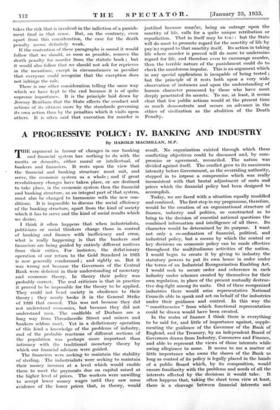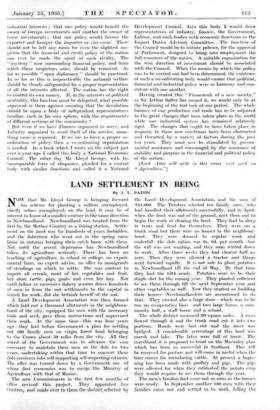A PROGRESSIVE POLICY : IV. BANKING AND INDUSTRY
By HAROLD MACMILLAN, M.P.
THE argument in favour of changes in our banking and financial system has nothing to do with the merits or demerits, either moral or intellectual, of bankers and financiers. It rests upon the view that the financial and banking structure must suit, and serve, the economic system as a whole ; and if great revolutionary changes have taken place, or are destined to take place, in the economic system then the financial and banking structure, as an integral part of that system, must also be changed to harmonize with the new con- ditions. It is impossible to discuss the social efficiency of the banking structure, apart from the kind of society which it has to serve and the kind of social results which we desire.
I think it often happens that when industrialists, politicians or social thinkers charge those in control of banking and finance with inefficiency and error, what is really happening is that the bankers and financiers are being guided by entirely different motives from their critics. For instance, the deflationary operation of our return to the Gold Standard in 1925 is now generally condemned ; and rightly so. But it was wrong not because the Governors of the Central Bank were deficient in their understanding of monetary and economic theory. In theory their policy was probably correct. The real criticism is that in practice it proved to be impossible for the theory to be applied. They could not bend society in obedience to their theory ; they nearly broke it in the General Strike of 1926 that ensued. This was not because they did not understand economics, but because they did not understand men. The coalfields of Durham are a long way from Tlircadneedle Street and miners and bankers seldom meet. Yet in a deflationary operation of this kind a knowledge of the problems of industry, and of the probable reactions of different sections of the population was perhaps more important than intimacy with the traditional monetary theory by which our financial advisers were guided.
The financiers were seeking to maintain the stability of sterling. The industrialists were seeking to maintain their money incomes at a level which would enable them to meet the payments due on capital raised at the higher level of prices. The workers were unwilling to accept lower money wages until they saw some evidence of the lower prices that, in theory, would result. No organization existed through which these conflicting objectives could be discussed and, by com- promise or agreement, reconciled. The nation was divided against itself. The conflict grew to its maximum intensity before Government, as the overriding authority, stepped in to impose a compromise which was really inconsistent with that brutal adjustment of costs and prices which the financial policy had been designed to accomplish.
Today, we are faced with a situation equally muddled and confused. The first step in my programme, therefore, would be the creation of an organizational structure of finance, industry and politics, so constructed as to bring to the decision of essential national questions the combined information and intelligence of all three. Its character would be determined by its purpose. I want not only a co-ordination of financial, political, and industrial policy, but a means by which the central or key decisions on economic policy can be made effective throughout the multitudinous activities of the nation. I would begin to create it by giving to industry the statutory powers to put its own house in order under the terms of an Industrial Reorganization Enabling Act. I would seek to secure order and coherence in each industry under schemes created by themselves for their own regulation, in place of the present mutually destruc- tive dog-fight among its units. Out of these reorganized industries there would arise representative National Councils able to speak and act on behalf of the industries under their guidance and control. In this way the " constituencies " from which functional representation could be drawn would have been created.
In the realm of finance I think there is everything to be said for, and little of importance against, supple- menting the guidance of the Governor of the Bank of England, and the Treasury, by an independent Board of Governors drawn from Industry, Commerce and Finance, and able to represent the views of those interests while owing allegiance to none. It seems to me a matter of little importance who owns the shares of the Bank as long as control of its policy is legally placed in the hands of a public Board which, by its composition, would ensure familiarity with the problems and needs of all the interests affected by the decisions it would take. It often happens that, taking the short term view at least, there is a cleavage between financial interests and industrial interests ; that one policy •would benefit the owner of foreign investments and another the owner of home investments ; that one policy would favour the exporter and hamper the importer or vice-versa. There should not be left any room for even the slightest sus- picion that the financial and credit policy of the nation can ever he made the sport of such rivalry. The " mystery " now surrounding financial policy, and from which these suspicions arise, should be removed. As far as possible " open diplomacy " should be -practised: In so far as this is impracticable the national welfare should be clearly safeguarded by a proper representation of all the interests affected. The nation has the right to control its own money. If, in the interests of political neutrality, this function must be delegated, what possible argument is there against ensuring that the devolution should be upon a body of independent representatives familiar, each in his own sphere, with the requirements of different sections of the community ? - But even if we have Finance organized to serve, and Industry organized to avail itself of the service, some- thing more is required. If we are to have a proper co- ordination of policy, then a co-ordinating organization is needed. In a book which I wrote on the subject just over a year ago I called this body a National Economic Council. The other day Mr. Lloyd George, with his incomparable force of eloquence, pleaded for a central body with similar functions and called it a National Development Council.- Into this body I would draw representatives of industry, finance, the Government, Labour, and such bodies with economic functions as the Import Duties Advisory -Committee. The function of the Council would be to initiate policies, for the approval of Parliament, designed to bring into employment the full resources of the nation. A suitable organization for the wise direction of investment should be associated with the Council. When the means by which the policy was to be carried out had been determined, the existence of such a co-ordinating body would ensure that political, financial and industrial policy were in harmony and con- sistent with one -another.
Having created this " Framework of a new society," as Sir Arthur Salter has named it, we would only be at the beginning of the real task of our period. The whole balance of our production and "trade has to be adjusted to the great changes that have taken place in the world while our industrial system has remained relatively rigid. The changes that ought to have taken place in response to these new conditions have been obstructed and thwarted by a variety of factors during the past ten years. They must now be stimulated by govern- mental assistance and encouraged by the assurance of_ stability and purpose in the financial and political policy of the nation.
[Lord Astor will write in this series next week an " Agrieulture."]















































 Previous page
Previous page